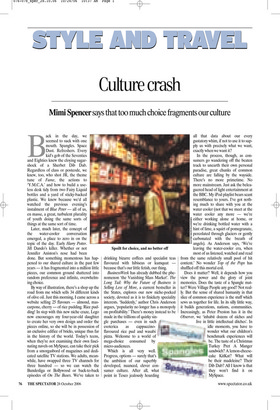Culture crash
Mimi Spencersays that too much choice fragments our culture Back in the day, we seemed to suck with one mouth. Spangles. Space Dust. Refreshers. Every kid’s gob of the Seventies and Eighties knew the cloying sugarshock of a Sherbet Dib Dab. Regardless of class or postcode, we knew, too, who shot JR, the theme tune of Fame, the actions to ‘Y.M.C.A.’ and how to build a useless desk tidy from two Fairy Liquid bottles and a yard of sticky-backed plastic. We knew because we’d all watched the previous evening’s instalment of Blue Peter — all of us, en masse, a great, turbulent plurality of youth doing the same sorts of things at the same sort of time.
Later, much later, the concept of the water-cooler conversation emerged, a place to zero in on the topic of the day. Early Harry Potter. Jill Dando’s killer. Whether or not Jennifer Aniston’s nose had been done. But something momentous has happened to our shared culture in the past few years — it has fragmented into a million little pieces, our common ground shattered into random preference and infinite, overwhelming choice.
By way of illustration, there’s a shop up the road from me which sells 34 different kinds of olive oil. Just this morning, I came across a website selling 25 flavours — almond, mascarpone, cherry — of rice pudding. Rice pudding! In step with this new niche craze, Lego now encourages my four-year-old daughter to create her very own design and order the pieces online, so she will be in possession of an exclusive edifice of bricks, unique thus far in the history of the world. Today’s teens, when they’re not examining their own fascinating navels on MySpace, can take their pick from a smorgasbord of magazines and dedicated satellite TV stations. We adults, meanwhile, have swapped three TV channels for three hundred — so we can watch the Bundesliga or Bollywood or back-to-back episodes of On The Buses. We’ve taken to drinking bizarre coffees and specialist teas flavoured with hibiscus or kumquat because that’s our little fetish, our thing.
BusinessWeek has already dubbed the phenomenon ‘the Vanishing Mass Market’. The Long Tail: Why the Future of Business is Selling Less of More, a current bestseller in the States, explores our new niche-pocked society, devoted as it is to finickety speciality interests. ‘Suddenly,’ author Chris Anderson argues, ‘popularity no longer has a monopoly on profitability.’ There’s money instead to be made in the trillions of quirky sin gle purchases — even in such esoterica as cappuccino flavoured rice pud and wasabi pizza. Welcome to a world of mega-choice consumed by micro-audiences.
Which is all very well.
Progress, options — surely that’s the ambition of our superbly developed, nuanced, clever con sumer culture. After all, what point in Tesco jealously hoarding all that data about our every gustatory whim, if not to use it to supply us with precisely what we want, exactly when we want it?
In the process, though, as consumers go wandering off the beaten track to unearth their own personal paradise, great chunks of common culture are falling by the wayside. There’s no more primetime. No more mainstream. Just ask the beleaguered head of light entertainment at the BBC. My iPod playlist bears scant resemblance to yours. I’ve got nothing much to share with you at the water cooler (not that we meet at the water cooler any more — we’re either working alone at home, or we’re drinking bottled water with a hint of lime, a squirt of pomegranate, percolated through glaciers or gently carbonated with the breath of angels). As Anderson says, ‘We’re leaving the water-cooler era, when most of us listened, watched and read from the same relatively small pool of hit content.’ No wonder Top of the Pops has shuffled off this mortal coil.
Does it matter? Well, it depends how you view the power and the glory of joint memories. Does the taste of a Spangle matter? Were Village People any good? Not really. But the sense of shared humanity in that slice of common experience is the stuff which sews us together for life. In its silly little way, it builds generations, nations, communities. Increasingly, as Peter Preston has it in the Observer, we ‘inhabit dozens of niches and
DAVID MONTGOMERY
live in little intellectual ditches’. In idle moments, you have to wonder what our children’s benchmark experiences will be. The taste of a Christmas Turkey Pret A Manger sandwich? A lemon-cheesecake KitKat? What will be their madeleine? Their Dib Dab? All I know is that they won’t find it on MySpace.


























































































 Previous page
Previous page